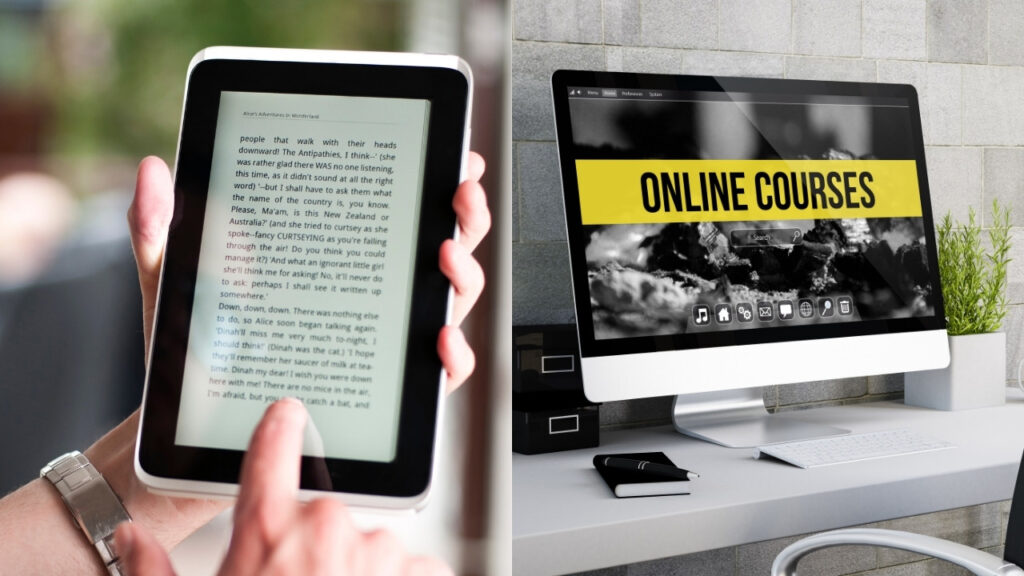So, you’ve got something people want — knowledge, experience, a skill you’ve mastered the hard way. You’re ready to turn that into income. But then the question hits you:
Do you start with an eBook or an online course?
It’s one of those deceptively simple choices that can shape everything about your brand and business. Pick right, and you’re off to the races. Pick wrong, and you’ll burn time, money, and motivation before you’ve even made a sale.
Let’s break it down like smart creators do — real talk, no fluff, straight strategy.

The Knowledge Game Has Changed
We’re living in a wild time for digital creators. Ten years ago, selling your expertise online was niche. Now? It’s the new small business model.
Every coach, freelancer, and subject-matter pro is building a “digital product.” And for good reason — the e-learning industry’s headed toward half a trillion dollars by the end of the decade. That’s billion with a “b.”
And right in the middle of that boom sit two big players: ebooks and online courses.
Both can make money. Both can build credibility.
But they fit different stages of your creator journey.
What We’re Really Comparing
Let’s get clear.
An ebook is the streamlined, bite-sized version of your expertise. You write it, design it, hit publish, and boom — it’s a digital product. Think of it like your business card that people pay for.
An online course, on the other hand, is a full learning experience. We’re talking video lessons, worksheets, quizzes, sometimes even live calls or communities. It’s not just information — it’s transformation.
Both are powerful, but they demand different kinds of work and bring different kinds of payoff.
Speed vs. Scale
Ebooks Are the Quick Start
If you’re new to this, ebooks are your best first move.
They’re fast. They’re low-cost. You can finish one before your next Netflix binge ends.
You don’t need cameras, fancy editing, or a learning platform. Just a good idea, solid writing, and maybe a Canva design that looks clean.
It’s the fastest way to test an idea and start building an audience. Think of an ebook as your “proof of concept” — the low-risk launch that gets the engine running.
You can have one up for sale this month. No excuses.
Courses Are the Long Game
Now, courses — that’s where the real money lives.
While ebooks usually sell for $20 to $100, courses can go from $200 to $2,000+ without blinking. Why? Because people don’t pay for pages — they pay for guidance, results, and transformation.
A course lets you go deeper: you can teach frameworks, demonstrate steps, and keep people engaged. It’s premium because it feels premium.
But yeah — it’s also more work. Filming, editing, structuring modules, setting up automations — it’s a project, not a weekend.
So the trade-off is clear:
Ebooks get you started. Courses get you paid.
Effort and Energy — Where Most People Mess Up
Most first-time creators overthink. They try to build the perfect course before anyone even knows who they are.
Here’s the truth: you can’t perfect what hasn’t been tested.
An ebook helps you test. It’s small enough to finish, light enough to launch, and fast enough to learn from. Once you’ve sold a few hundred copies and collected feedback, you’ll know what people actually want more of — and that becomes your course.
Skip validation, and you’ll spend months recording videos that no one watches.
Validate first, and you’ll have paying customers before you hit “record.”
Engagement: Why Courses Feel Stickier
Let’s be real — reading is self-paced, but learning with structure keeps people in motion.
Courses pull students in. Video, audio, community, accountability — it’s all designed to keep folks engaged. People who enroll in a course feel committed; they’ve put money and time on the line. That alone makes them more likely to finish.
Ebooks, on the other hand, are like that gym membership you mean to use — low cost, low pressure, easy to drop. But that doesn’t make them useless. It just means ebooks are better for sparking curiosity, not long-term transformation.
If your skill needs demonstration — how to code, cook, build, design, or coach — a course wins.
If it’s conceptual or strategic, like marketing, productivity, or mindset, an ebook can carry the message beautifully.
Credibility: The Perception Game
Let’s talk optics — because perception sells.
An ebook says, “I’ve got something valuable to teach you.”
A course says, “I can take you somewhere.”
Both are trust builders, but they hit different levels of authority.
When you publish an ebook, you become a thinker. When you launch a course, you become a leader.
If you’re early in your creator career, an ebook helps you plant your flag. It’s your intellectual handshake. Once people start quoting your ideas, you’ll know it’s time to scale up to a course.
Audience Size and Trust
Selling a $20 ebook to strangers is doable.
Selling a $500 course? Not so much — unless they already trust you.
That’s why ebooks are the relationship starter. They get you in the door. They show people you know what you’re talking about, without asking for a big leap of faith.
Once readers love your ebook, converting them to a course customer becomes 10x easier. It’s a natural funnel — from curiosity to commitment.
If you’re building from scratch, start small. Let your ebook do the heavy lifting for awareness and authority.
Profit, Maintenance, and Headspace
Ebooks are practically pure profit. You make it once, and it sells forever. No ongoing costs, no tech headaches.
Courses, while more lucrative per sale, come with extra work — platform fees, customer support, tech maintenance, and updates. You’ll spend time keeping your content fresh and your students happy.
If your goal is lean passive income, ebooks are gold.
If your goal is deep engagement and high-ticket offers, courses win.
It’s not about what’s “better.” It’s about what’s better for you right now.
The Hybrid Power Play
The smartest creators don’t pick sides — they stack.
Here’s the move:
- Launch an ebook first. Validate your topic, build your list, get feedback.
- Turn it into a course. Use what readers loved most as the backbone of your lessons.
- Bundle them together. Sell the ebook as a bonus for your course or as a standalone entry offer.
Now your products feed each other. The ebook warms leads. The course closes them. You’re building a real business ecosystem, not just one-off sales.
Marketing Flow — The Funnel in Motion
Think of ebooks as top-of-funnel magnets. They bring people in. They let your audience test the waters.
Courses? They’re middle and bottom of the funnel — the commitment stage. When someone buys a course, they’re saying, “I trust you enough to guide me.”
So the formula’s simple:
- Attract with content.
- Nurture with your ebook.
- Transform with your course.
That’s how modern creators build seven-figure brands without spending seven figures on ads.
Tech, Tools, and Reality Checks
If you can handle Google Docs and Canva, you can launch an ebook. Platforms like Gumroad, Payhip, or Amazon Kindle make selling stupid simple.
Courses need more infrastructure — video recording, editing, hosting (Teachable, Kajabi, Thinkific), maybe an email automation. None of it’s rocket science, but it takes time and learning curves.
So be honest about your bandwidth. If you’re working solo, start light.
Momentum beats complexity every single time.
Longevity — Which Ages Better?
Ebooks age well. They’re easy to update, rebrand, or re-release. Change a few pages, re-upload, done.
Courses? More moving parts. Update a slide deck, re-record a video, re-upload modules — it’s work. But in return, courses build community and retention. Students stay longer, buy more, and often join coaching or memberships.
So: ebooks bring reach. Courses bring relationships.
Validation — Your Safety Net
If you’re not sure your idea will sell, don’t gamble months building a course. Test it with an ebook first.
You’ll learn:
- What people actually care about.
- What they’re willing to pay for.
- What transformation they expect.
That data is gold. It’s not just validation — it’s free market research that funds your next move.
Buyer Psychology
Ebook buyers want information.
Course buyers want results.
Simple as that.
If your audience is DIY-minded, wants quick wins, and prefers reading — ebooks will click.
If they crave accountability, step-by-step help, and live guidance — go course.
You’re not just building a product; you’re matching a mindset.
Quick-Fire Decision Map
| Question | Yes? | Start With |
|---|---|---|
| You’re new or audience is small? | ✅ | Ebook |
| You need validation fast? | ✅ | Ebook |
| You’re comfortable on camera? | ✅ | Course |
| You want higher prices + deeper impact? | ✅ | Course |
| You hate ongoing maintenance? | ✅ | Ebook |
| You already have followers? | ✅ | Course |
Use it like a compass — not a rulebook.
Let’s Talk Numbers
Here’s what the math looks like:
- Sell 300 ebooks at $49 = $14,700
- Sell 30 courses at $497 = $14,910
Same revenue, different strategies.
Ebooks win with volume; courses win with value.
Ask yourself: What do I have right now — reach or depth?
If you’ve got reach (social following, email list), ebook first.
If you’ve got depth (loyal fans, proven expertise), course now.
Real Example
Nathan Barry — founder of ConvertKit — started with an ebook called Authority. It took off, built his audience, and later inspired courses and software that turned into a multi-million-dollar company.
He didn’t start with a big product. He started with proof.
That’s how momentum compounds.
The Bottom Line
Ebooks and online courses aren’t rivals. They’re chapters of the same story.
Start with an ebook when you need speed, clarity, and validation.
Move to a course when you’re ready to scale, engage, and transform.
Ebooks build trust. Courses build empires.
The biggest mistake? Waiting for “perfect.”
Launch the simple version now, learn what clicks, and let the market tell you the next step.
Because in this game, it’s not the smartest or most polished creators who win —
it’s the ones who ship, learn, and keep moving.
